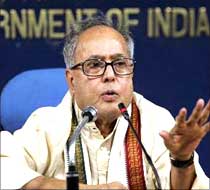In the Budget 2010-11, to be presented towards the end of this month, Finance Minister Pranab Mukherjee should aim for rationalisation of the Customs tariff, unification of the central excise and service tax rates and simplification of the indirect tax laws.
 The Customs tariff is much too complicated with basic Customs duty, two types of additional Customs duty and two types of cess. The least that the finance minister can do is to abolish the education cess and higher education cess.
The Customs tariff is much too complicated with basic Customs duty, two types of additional Customs duty and two types of cess. The least that the finance minister can do is to abolish the education cess and higher education cess.
Whether these actually contribute enough to the cause of education is far from well established. There is no dispute that more needs to be in the education field. But resources can be raised in simpler ways also, say by factoring in the needs for funds of the education sector in the tax rate itself.
The finance minister can have a look at the exemption notifications and see how they can be harmonised better. In case of capital goods, there are four rates - the normal rate of 7.5 per cent, the lower rate of 5 per cent for project imports, 3 per cent for imports under the Export Promotion Capital Goods scheme and the zero-duty EPCG scheme for select sectors. It is better to lower the duty on capital goods to 5 per cent and get rid of the exemptions.
Even in respect of other items, the finance minister should recall the Prime Minister's statements that India should move towards the levels of tariff prevalent in the countries of Asean (Association of South East Asian Nations) and look for ways to get there.
Any apprehensions that domestic industries would suffer or that fiscal position would deteriorate may not be very well founded. Whenever import duty rates have been reduced, the economy has grown faster, becoming more competitive and the revenues have grown.
There are many exemption notifications that are outdated. For example, the notifications on re-import still mandate following procedures specified in Rule 173 MM of Central Excise Rules, 1944, and de-logging of DEEC book.
The Central Excise Rules, 1944, was replaced by new Rules in 2001 and DEEC was abolished in 2002. Even after nine years, the notifications have not been amended. Such outdated notifications need to be re-worded correctly.
In particular, the notifications giving effect to the Foreign Trade Policy 2009-14 provisions that have number of defects need to be corrected. The documentation for availing central excise exemption for supplies against International Competitive Bidding must be spelt out clearly.
As a prelude to the introduction of the Goods and Services Tax, the finance minister must strive to unify the central excise and service tax rates. Both of these can attract a uniform rate of 10 per cent or 12 per cent.
Many manufacturers running huge unutilised Cenvat (central value added tax) credit might actually welcome higher rate of 12 per cent, so that they can utilise the large Cenvat credit accumulated when the excise rates were higher and even the prices of inputs were higher.
Central excise rate of 12 per cent will also help reduce fiscal deficit. A raise of mere 2 per cent in central excise may get the government little revenue as most manufactures will merely utilise the available Cenvat credit to pay higher duty.
The finance minister must avoid tinkering with the tariff to please select lobbies. He should rather look to eliminate anomalies. Simplification reduces unnecessary paperwork, transaction costs and corruption at the ground level.
What do you expect from the forthcoming Budget for 2010-11? Tell us!








